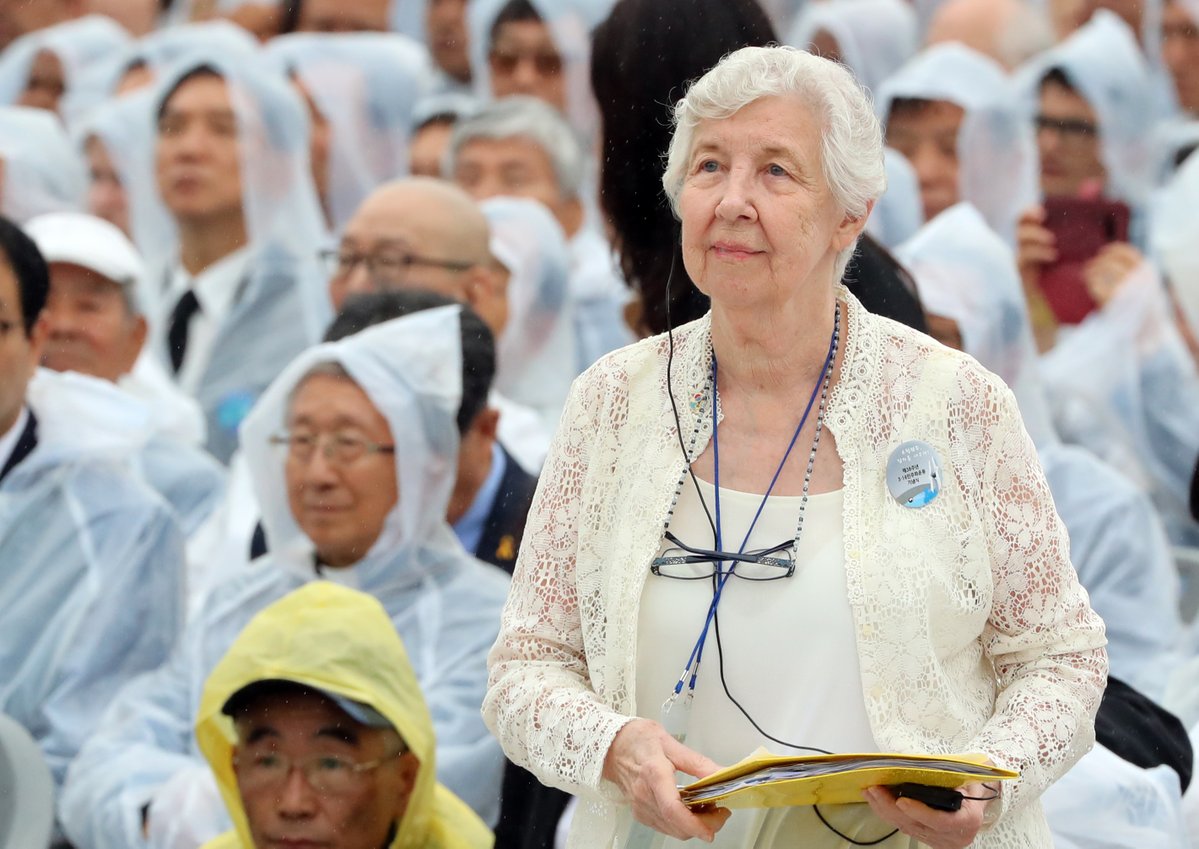Sharing the May 18 Atrocities with the World: Interview with Martha Huntley, Former Gwangju Missionary
Written by Wilson Melbostad
Nearly 40 years have passed since citizens came together and took to the streets in May of 1980 in the Gwangju Democratic Uprising. The uprising became a key stepping stone towards the ultimate democratization of South Korea seven years later during the June Struggle of 1987. Yet, during those seven years prior, then-dictator Chun Doo Hwan and his administration were intent in trying to wipe away any evidence that the uprising took place. Last year, the Gwangju News interviewed the author of the Gwangju Diaries, Lee Jae-eui, one of the central figures in keeping the story of the uprising alive. Following suit, this year we have decided to interview another hero of the uprising, Martha Huntley, widow of the late Reverend Charles Betts Huntley. The couple came to Gwangju as missionaries and were key in sharing the story of the uprising with the rest of the world. The Gwangju News caught up with Ms. Huntley to hear her side of the story and convey her message all these years later to the city of Gwangju.
Gwangju News (GN): Please tell us about how you and your husband Charles first ended up coming to Korea? How did you find life when you first arrived here? Anything in particular that took you by surprise?
Martha Huntley (Huntley): Both my husband (Charles Betts Huntley) and I were born and bred, grew up, met, and married in Charlotte, North Carolina [U.S.A]. He was five years older, and his family lived on the other side of town, so we did not meet until just after he graduated from Union Theological Seminary in Richmond, Virginia.
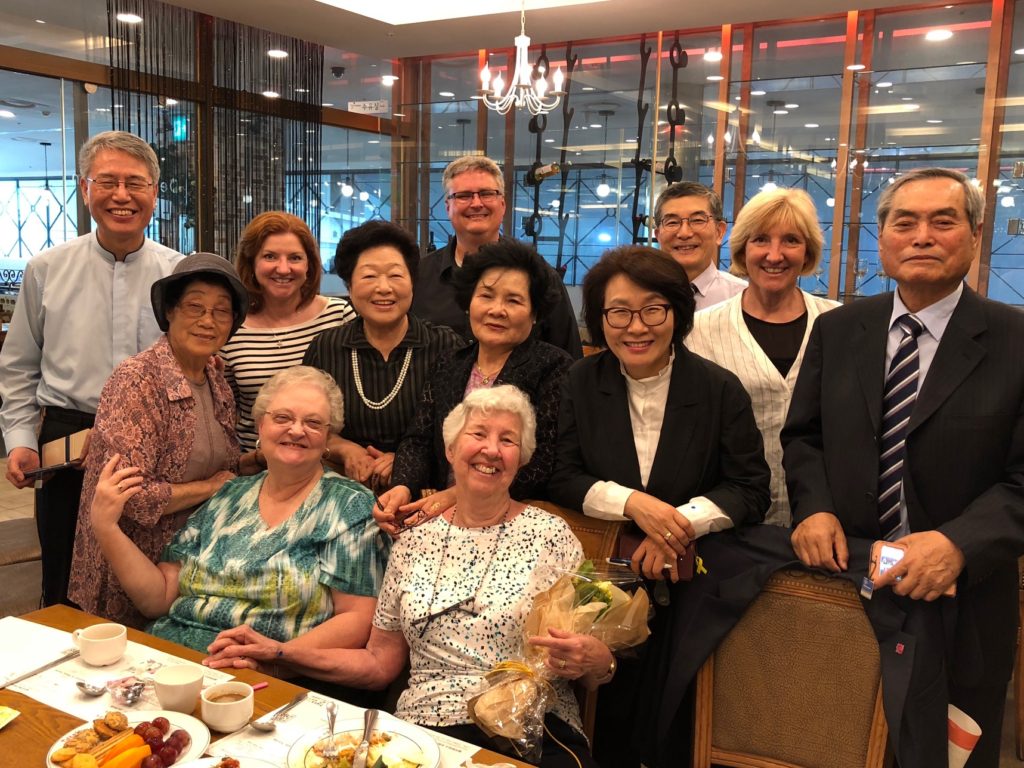
At the end of my sophomore year, in June, 1961, home for the summer, I heard about the four Huntley boys, three of whom had just graduated from seminary. I was a devout Presbyterian and so were they, and I really liked what I read of them in the write-up about them in our presbytery newsletter. I called to get an interview with them and happened to get Betts on the phone. Betts had grown up hearing good, exciting things about Korea and the growth of Christianity, the church, and the people there. He had decided at an early age that he wanted to be either a missionary to Korea or a commercial pilot when he grew up. He took flying lessons and got his license to fly at age 15, before he got his driver’s license. But his eyesight was not good enough to be a commercial pilot. So, he was headed for Korea from about that time. When I interviewed him, I liked him immensely, and I thought it would be wonderful to be a missionary to Korea, a very rewarding life, and so it proved to be, and it all came about.
When we arrived in 1965, Korea was very much still a third-world country as they used to say back then. It had been devastated by the Korean War and the Japanese occupation that lasted from 1910 until the end of WWII. In Seoul, we saw streets still being paved for the first time, electrification of the city just being finished up. People were very poor – many, many widows and orphans. Average income at that time, I believe, was around $90 a year. A haircut was 10 cents. Taxis were very cheap. Gas was high, I remember something like $5 a liter. None of the people we knew had refrigerators, running water, indoor plumbing (though in fact, we did).
We were surprised by how gracious and accepting most everybody was – by the strength, resiliency, and we thought, warmth and charm of the Korean people. We were surprised at how many people wanted to learn English, go to America, become a Christian, and join a church. It was heaven for missionaries and saving grace for us personally.
GN: You and your husband are, and forever will be, connected to the events that took place on May 18, 1980. I know you have probably recited your story about the uprising many times to many people, but would you mind sharing an abridged version with us?
Huntley: The timeline is Gwangju was attacked beginning at 4 a.m. at the end of curfew the morning of Sunday, May 18, 1980. We were in Daejeon, returning home by bus and back home around lunchtime. Because it was a Sunday, a lot of the people who were on the street early were going to sunrise worship services, Sunday school services (including a lot of children), and church services – many of these had been attacked on the street. By the time we had arrived, those attacked included a number of our friends and acquaintances who were calling us, or their family or friends were, telling us what had happened to them. One young adult was pulled off the bus as he was going to church by paratroopers, beaten and kicked around the head, and lost an eye; the wife of a friend taking her two little children to Sunday school was attacked and left in a pool of blood on the city street – she wasn’t in her right mind for months, and her husband was out with others fighting the paratroopers with chunks of concrete torn from city sidewalks that afternoon; people were calling to say military trucks had pulled up in their neighborhood and soldiers had taken those who were students, mostly college students, but also high school students, and young people who were of college student age off to jail in the trucks. Soon, when a truck would pull into a neighborhood, the people who lived there would come out in force and chase off the soldiers and commandeer the truck – there were a lot more citizens (800,000) than paratroopers (10,000). We were getting reports of women spontaneously cooking and taking food to those resisting the soldiers that very first day or two. After Sunday, the phone lines were cut, and we didn’t get those kinds of reports.
After ten violent days, the paratroopers were withdrawn, and Chun’s occupying forces drove into the city in tanks and trucks at 3 a.m., I believe, breaking all the points of the agreement that had been hammered out between the city and the military: that they would not enter the city until such and such a date, that they would come in peacefully, students would be released from the jails, families of the murdered would be compensated, medical bills of the wounded would be paid, and the military would acknowledge it was they who had attacked the city.
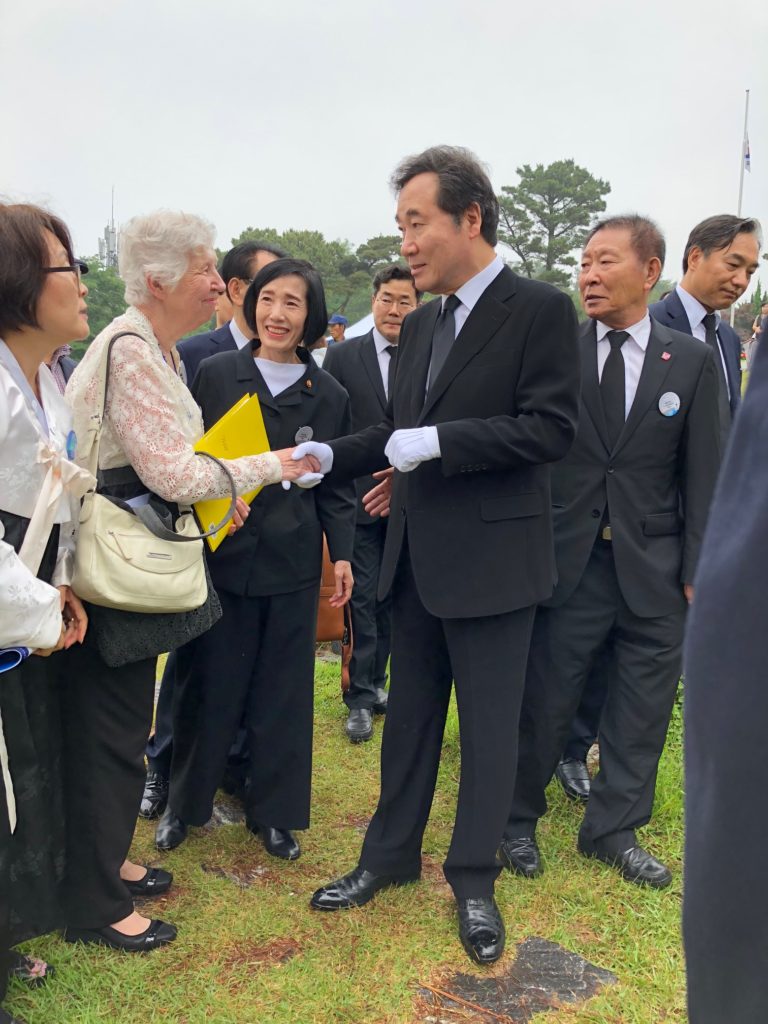
In the nighttime hours, maybe about 3 o’clock – we were sleeping in our regular clothes all these days not knowing what would happen any given night – we could hear the young students on bullhorns urging others to come to City Hall and the YMCA to join them in resisting the troops as it became evident that a large military body was en route and was coming in with tanks and trucks. This was truly heartbreaking. The next day, we went to the YMCA and saw the bloodstains everywhere where middle and high school students mostly had gathered. This was the time our seminary student, who had been among those collecting guns from the students so they wouldn’t kill or be killed, was shot with no questions asked when he was found with a mound of guns.
GN: What was the rationale for you and your husband to become involved in the uprising and come to the aid of the Gwangju people?
Huntley: Our rationale was that we decided to stay in Gwangju, no matter what happened, to try to help our neighbors and friends and the people of Gwangju in any way we could, to provide shelter for any seeking it from us, to document with photos the atrocities that we were seeing because of the wounded flooding the hospital and in a number of other ways as things developed. We decided early on to assist any reporter or photographer who located us with translation, and to try to get word of what was happening in Gwangju out to the outside world.
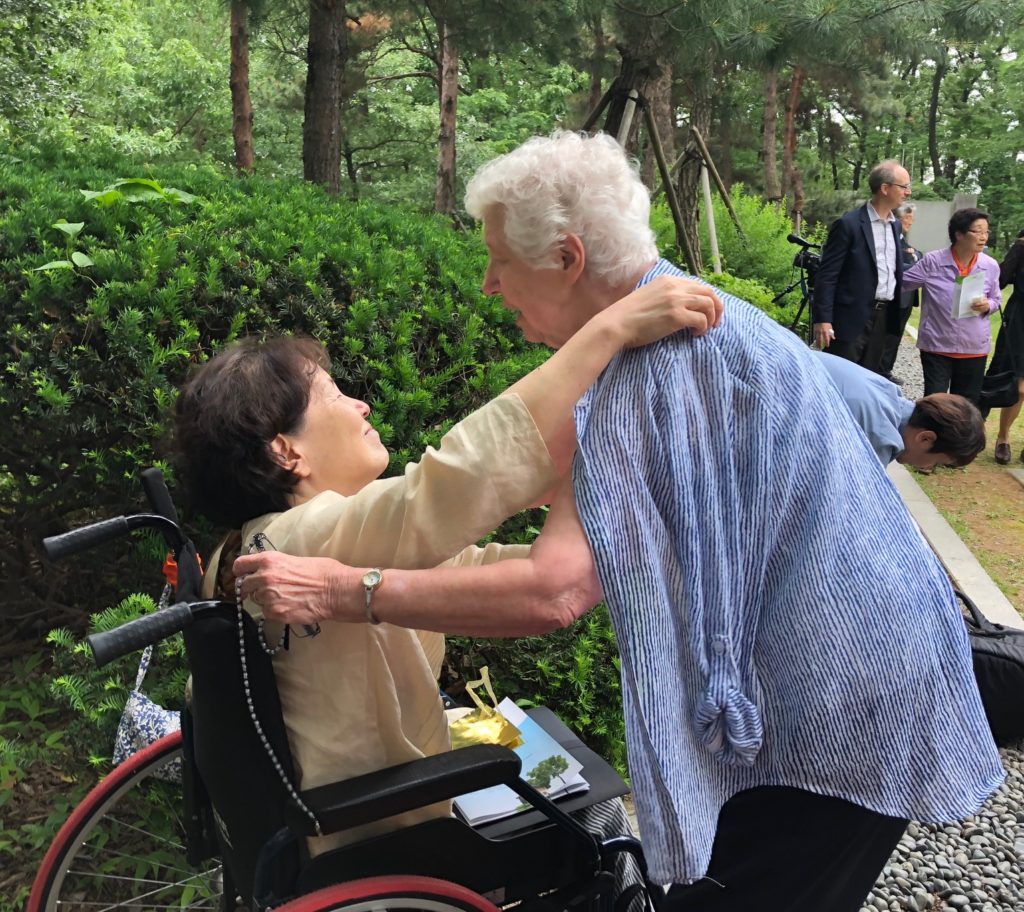
ashes interment and memorial at Gwangju’s missionaries cemetery.
Our decision to stay wasn’t made on the basis of politics; we didn’t think of it really in political terms. We thought of it in crisis terms. At the beginning of the satae (사태, incident), no one knew what was happening, where or why the violence was originating. We all were just responding to the circumstances of the whole city, and especially its youth, being aggressively attacked. There was no way to remain “neutral” when so many people we knew had been beaten, arrested, put in prison, killed, wounded… You just had to respond some way, and ours was to open our house to those who came, which is something we’d always done in Gwangju, to take pictures of what was happening – a very normal activity for Betts – to try to find out what was going on, to write it up, and to help those who were trying to find out. No one who was in Gwangju those days in May was uninvolved. We did what came naturally, and what we thought God would want us to do.
GN: Can you talk a little more about in what ways, specifically, you and your husband became involved?
Huntley: During this time, Betts was most busy with his work at the hospital. This included usual duties and visiting all who were admitted with the other hospital evangelists. From the early days, he would take the reporters and the investigating church delegates to the hospital and translate for them to question the patients and translate the patients’ stories. The people of Gwangju were very eager for their stories to be told and known. They were separated from speaking to or with anyone outside of Gwangju during the ten days of the “invasion” – phones cut off, roads closed – they couldn’t even reach close family members and vice-versa. They counted on us to help get the truth out.
We were not part of the fighters at all, though we sympathized with them, and we never encouraged anyone to fight. If asked, we’d say not to. The bloodshed seemed so senseless. But it was a natural reaction to the ruthlessness of the paratroopers those first ten days.
And under the following occupation, it was illegal to talk about what had happened. Many people went to prison because of this – just talking about it, or even praying aloud about it in churches in some cases. We foreigners could talk fairly freely with each other – who would hear or report us? Many of our students came to us during the ten days to ask what we thought they should be doing. We did not encourage them to join the student activists who were fighting back; if they had guns, we encouraged them to turn them in, and a number did. Our mission gardener found a homemade bomb in our garden, and we always assume it was student made and left there rather than used, just as the guns were turned in.
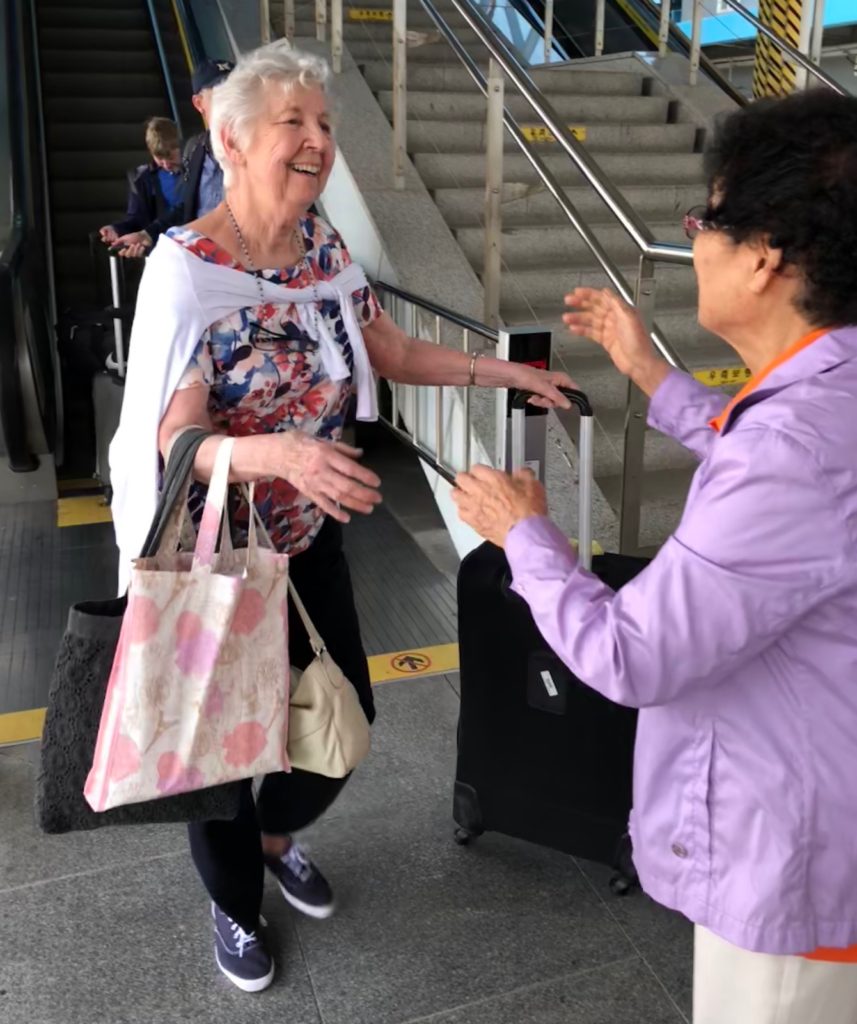
After the fighting and during the occupation for the next 15 months, we kept reporters, photographers, and church investigating groups in our homes, for meals, and some overnight, and translated for them. It seemed like we always had someone from somewhere who had come to Gwangju to find out the truth of what was going on. We had several students who had been wounded, tortured, and/or were afraid of being hauled back to prison stay with us.
I imagine the other missionaries were doing similar things. We really didn’t talk about it much among ourselves, primarily so as not to have any information that might damage anyone else. That’s one reason we didn’t keep written records or notes or even a journal – because we wouldn’t risk incriminating someone by name or even by description, which could easily be traced.
GN: We understand that after the events of May 18 and your eventual return to the States, you were somewhat disconnected from the May 18 fact-finding and reconciliation efforts going on locally in Korea. How were you able to reconnect with Gwangju and ultimately come over for a visit last year?
Huntley: On January 29, 2018, I received an invitation from the 5.18 Committee to come to Korea for the commemoration of the May 18 events. I wasn’t planning to come, as I am quite deaf now and had been away so very long. I knew it would be an elaborate affair, and I wasn’t at all sure I was up to it emotionally or otherwise, as a fairly recent widow and as someone who had been gone from Korea for so long (33 years) and could speak so little Korean, and that so poorly. But before I wrote back to the committee, while I was at prayer about five days after the invitation had arrived, God told me that if I really loved these people, the people of Gwangju and Korea, I must go; that He would be with me every step of the way, and to trust Him. So, I replied that day that I would be coming, with several family members (who would pay all their own expenses).
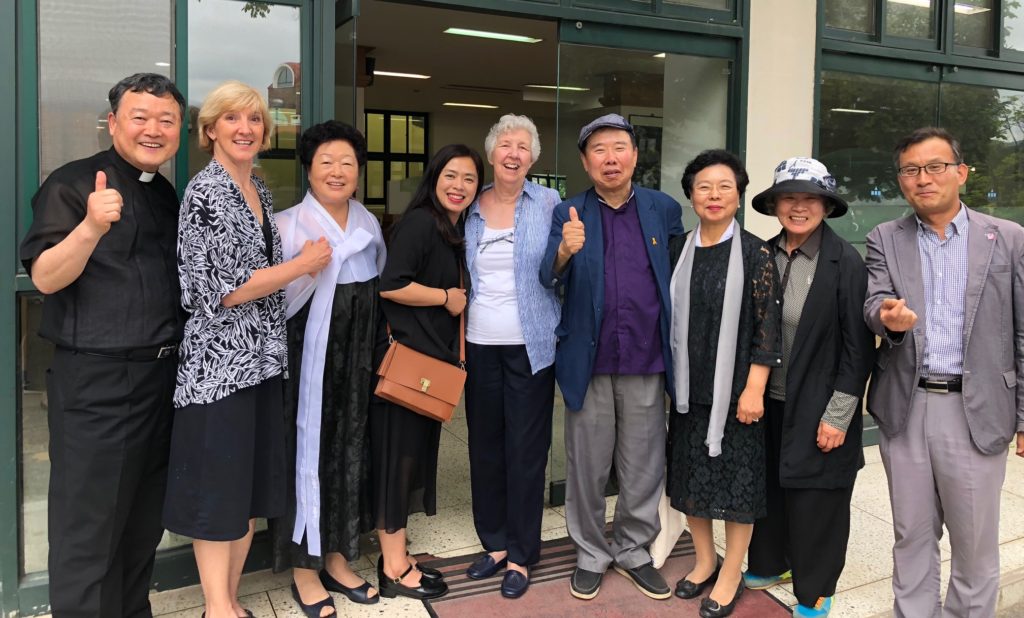
GN: A question a little more related to the locals here in Gwangju: The Kwangju Christian Hospital and Honam Theological Seminary have been mainstays of the missionary presence in Gwangju. Do you perhaps have any thoughts on the development of the neighborhood over the years?
Huntley: In the years 1969–1985, when we lived in Yangrim-dong, it was a vibrant, crowded, bustling place. The street running between the hospital and the mission compound was always crowded and lined with small mom-and-pop stores, very simple but they all seemed to do good business. There were always a lot of students of all ages, but especially the Speer Middle and High School girls in their school uniform going and coming from the girls’ school next to the compound (I was often coming and going there, too). The original Honam building was not much bigger than a home of that early 1960’s era and may have started in a Korean house. Not sure that it had a thatched roof, but it was pretty traditional. The seminary was very young then and did not stay there long. They built a nice building on the hill on the other side of the compound and to its back. And it grew and grew, and improved and improved.
When we moved to Gwangju in 1969, I think there were 10 Presbyterian churches in the city, and Yangrim Presbyterian Church was among them and a leader among them. Now I believe there are over 100 Presbyterian churches in the presbytery and several located in Yangrim-dong. The church was the highest edifice one saw looking from our missionary hilltop cemetery toward Mt. Mudeung. Now, there are rows and rows of apartments and condos. The skyline has certainly changed, and putting pictures of our early days there beside the present skyline is quite a dramatic contrast!
My family literally had a hard time recognizing Gwangju’s different neighborhoods and streets, and even Yangrim-dong until almost at our former home. We had walked those streets – we walked everywhere in those days – all the way to the heart of downtown and the “walking street” [Chungjang-ro], and now, so different. But I think the spirit of Yangrim-dong, which was always warm and robust, engaged with life itself, was strong then and is equally strong today. We loved and love that neighborhood, as well as the city and its people.
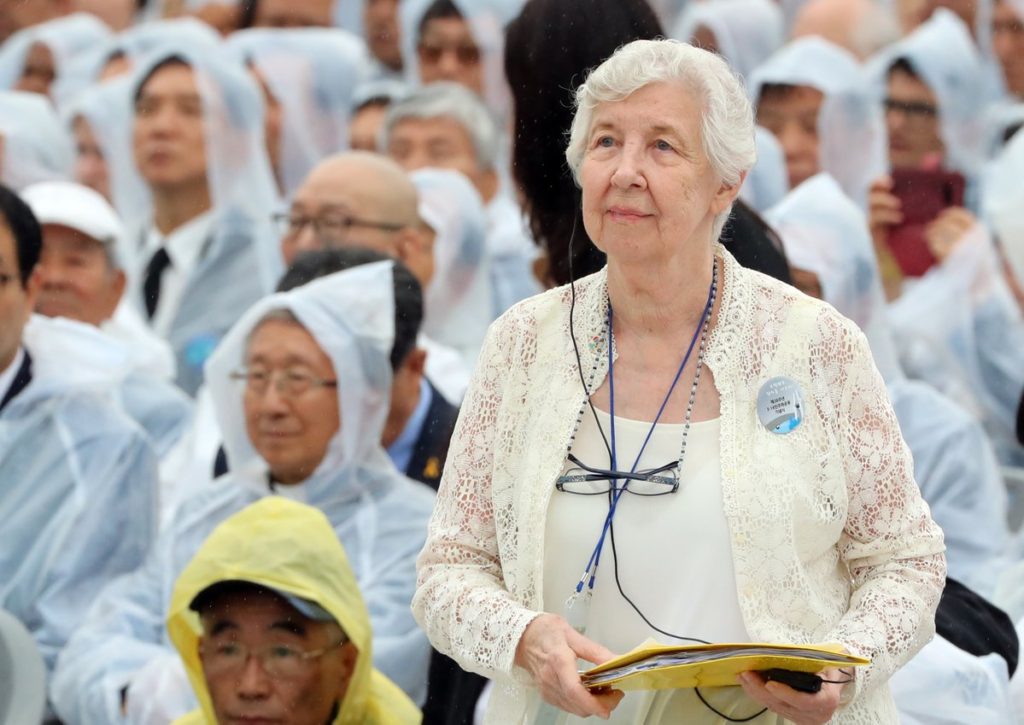
GN: Is there a particular message about the May 18 Uprising that you’d like to express to the people of Gwangju? Particularly, to the younger generation or those who didn’t experience what Gwangju was like during that time?
Huntley: First of all, I guess, I’d like to thank the people of Gwangju, those whom we knew and worked with, and worked for, for their grace, acceptance, strength, resilience, faith, and friendship during the years we lived there. We were pretty green foreigners, but we always felt that we were accepted and surrounded by people who would protect and help us if needed. People were so patient with our ignorance of so much Korean (in my case the language) culture and traditions. But it was a joy for us to learn those things, and we found the people of Gwangju from all walks of life and economic status eager to learn and eager to teach.
I also want to thank Korea in general and Gwangju in particular for the wonderful welcome my family received last year, May 14– 18. I’d like to thank them for receiving my sweet husband’s ashes and giving those last earthly remnants of him such a beautiful resting place.
As I expressed during my visit last year, I am amazed at how Gwangju has become a symbol of democracy and a leader in the democratization movement. There was significance in all that suffering and bloodshed of May 1980 and the years that followed. The memorial park, the graves of the fallen, especially the first 27 that I saw when it was opened – great pain and loss – but not in vain. God and the people redeemed the evil time. I am so proud of Gwangju, and proud to be able to call myself a person of Gwangju. It is a city that will always be linked with the words “freedom” and “justice.”
Photographs courtesy of Martha Huntley
The Author
Wilson Melbostad is a human rights attorney hailing from San Francisco, California, who is proud to call Gwangju his second hometown. Wilson is a lecturer at Chonnam National University who, in his spare time, works on various pro bono legal cases throughout the country. Wilson also enjoys breakfast food to the point where he feels comfortable putting such information in his bio.





